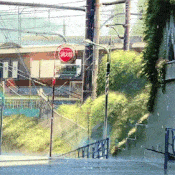|
Family Values posted:It was sarcasm. I debated adding a smiley but thought it was obvious enough without it. Calling a government regulation "the invisible hand" kind of confused me too. Next time use the sarcasm smiley. poes law and all.
|
|
|
|

|
| # ? May 10, 2024 09:53 |
|
I'm looking forward to our future where Amazon Drones deliver bottled water to us, sold by the kind Water Barons at Nestlé® Corp.
|
|
|
|
nm posted:Also, the crop everyone shouldbget mad about is Alfalfa. It takes a huge amount of water, can be grown anywhere, and a huge amount of it is exported. It isbofteb grown in the driest places like the Imperial Valley. This a thousand times this. Alfalfa and by extension our Happy Californian Cows are a much bigger part of the problem than any other crop or Ag use. 
|
|
|
|
Trabisnikof posted:This a thousand times this. Alfalfa and by extension our Happy Californian Cows are a much bigger part of the problem than any other crop or Ag use. Where'd you grab that? It's a sweet graph and I'd like to read the data behind it. Also man, I thought almonds were the worst. Apparently not. 
|
|
|
|
Sydin posted:Where'd you grab that? It's a sweet graph and I'd like to read the data behind it. http://www.arb.ca.gov/fuels/lcfs/workgroups/lcfssustain/hanson.pdf Almonds are just a fun factoid that was in a Mother Jones infographic.
|
|
|
|
Don't forget that soil salinity is a serious concern as well, and needs to be considered alongside raw water use. Rice uses a ton of water there but a huge amount of that water is flood control runoff and causes no salinity issues, while alfalfa growing is entirely irrigation and thus hugely vulnerable to soil deterioration.
|
|
|
|
GuyDudeBroMan posted:Calling a government regulation "the invisible hand" kind of confused me too. Next time use the sarcasm smiley. poes law and all. The sarcasm was about removing the regulations and trusting the farmers to act responsibly being a good idea in the same way that I think you're a good poster.
|
|
|
|
Family Values posted:The sarcasm was about removing the regulations and trusting the farmers to act responsibly being a good idea in the same way that I think you're a good poster. What would happen if the farmers had to pay market price for water? Would that change their behavior? Would we see more or less cotton, rice and alfalfa being grown?
|
|
|
|
GuyDudeBroMan posted:What would happen if the farmers had to pay market price for water? Would that change their behavior? Would we see more or less cotton, rice and alfalfa being grown? They would plant the most valuable crops in order to continue to consume enough water to keep all of or as much of their land productive as possible. So probably more, if those are the most valuable crops.
|
|
|
|
Food prices would skyrocket accordingly, because there is no way that the wealthy are going to allow themselves to take a hit from such a change. It is the reaction from everyone else after that that would be interesting.
|
|
|
GuyDudeBroMan posted:So what you are saying is that 80% of 50% is the same thing as 80% of 100%? It's 80% of water meant for human use, that is used by agriculture. Not 80% of literally all the water in CA.
|
|
|
|
|
GuyDudeBroMan posted:What would happen if the farmers had to pay market price for water? Would that change their behavior? Would we see more or less cotton, rice and alfalfa being grown? Who gets to sell this market-rate water? The people who live next to it?
|
|
|
|
Family Values posted:They would plant the most valuable crops in order to continue to consume enough water to keep all of or as much of their land productive as possible. So probably more, if those are the most valuable crops. So what you are saying is that if government regulations and subsidies stopped and farmers had to pay more for water, they would probably grow more water intensive crops because it costs more and leads to less profits. Makes sense to me.
|
|
|
|
"Government regulations" includes all kinds of things, some of which are very good (like, you must reserve x. amount of flow in this river for the fish, so we don't drive our aquatic wildlife to extinction) and some of which are very bad (you can extract as much water as you want from your well, even though this drains an aquifer that extends for hundreds of miles beyond your property's borders). California's water system is hosed in part because CA's regulations are a mishmash of ancient and more modern systems, piled one atop another, with all manner of loopholes and unintended effects. The most important problem with regards to agricultural water regulation is that the only people the regulators hear from (by "hear from" we mean "makes contributions to campaign funds") is the large agricultural lobbies. The average voter has not shown much propensity to give a gently caress. And what is needed is a significant overhaul, one that will require years of effort, a lot of pain for a lot of different involved entities, and therefore a lot of political courage on the part of a majority in the legislature. It is much, much, much easier for those same regulators to lay claim to 'doing something about the water crisis" by passing laws telling residential water customers to cut their usage by 25% and then leaving it to municipal water districts to implement those restrictions however they can. Unless it becomes clear that the legislators who vote for those kinds of bills, but who are not working on comprehensive ag water reform, are going to lose their jobs over it - or, at the very least, see significant campaign funds go to their political opponents in the next election cycle - there is not going to be reasonable movement on the issue. But. But. Instead of tackling a comprehensive and painful and politically risky total overhaul, it would be a lot easier for regulators to just pass a bill to do something simpler, like (say) prohibit the growing of alfalfa for export during drought years. That would not solve the problem, it would unfairly target a single subset of farmers (although those farmers could presumably grow something else on their land, so it's not like it just blanket puts them out of business), but it'd be better than nothing at all, which is what we have right now.
|
|
|
|
Leperflesh posted:
Do you really have to put people in jail for growing alfalfa to get that result though? What would happen if alfalfa farmers had to pay market price for water during drought years? What if all farmers had to pay market price? Would that change what types of crops they grew?
|
|
|
|
GuyDudeBroMan posted:Do you really have to put people in jail for growing alfalfa to get that result though? What would happen if alfalfa farmers had to pay market price for water during drought years? What if all farmers had to pay market price? Would that change what types of crops they grew? GrumpyDoctor posted:Who gets to sell this market-rate water? The people who live next to it?
|
|
|
|
GrumpyDoctor posted:Who gets to sell this market-rate water? The people who live next to it? Who sells it now? Where does water come from?
|
|
|
|
GuyDudeBroMan posted:Who sells it now? Where does water come from? You don't like the current system. I want to know what your proposed "totally free water market" would look like. Can I pull whatever I want out of a well? Can I do whatever I want to a river I own land next to? Can I dam it or divert enough to affect downstream use? And how do I answer all of these questions without government regulation?
|
|
|
|
GrumpyDoctor posted:You don't like the current system. I want to know what your proposed "totally free water market" would look like. Can I pull whatever I want out of a well? Can I do whatever I want to a river I own land next to? Can I dam it or divert enough to affect downstream use? And how do I answer all of these questions without government regulation? GuyDudeBroMan posted:Who sells it now? Where does water come from?
|
|
|
|
If you're going to make a point GuyDudeBroMan, loving make it. Post your actual position on the issue without trying to do stupid gotcha bullshit.
|
|
|
|
Oh, for gently caress's sake. You get to use and sell water you live next to according to the arcane terms of the permit you get from a government agency that's assigned through a convoluted process. Some of these rights were assigned over a century ago. You can pretty much pull whatever you want out of the ground unless a court told you can't. What does this system look like if we take the government out of the picture, and how is it better?
|
|
|
|
GrumpyDoctor posted:Oh, for gently caress's sake. You get to use and sell water you live next to according to the arcane terms of the permit you get from a government agency that's assigned through a convoluted process. Some of these rights were assigned over a century ago. You can pretty much pull whatever you want out of the ground unless a court told you can't. So government regulations on water are causing an unintended consequence? Is this your argument? Where do the prices for water come from? How are they determined?
|
|
|
|
A complex system of water sources, including freeflowing rivers, reservoir systems on rivers with dams, and groundwater sources. A system of water rights going back over a century grants inheritable priority to some water sources. Some rules require that a rights-holder extract everything they're entitled to, or their entitlement goes down the following year. Some rules allow water to be sold, and a "market" exists for that sold water. The price paid for water is sometimes zero, sometimes purchased from other rights-holders for pricing that does or does not take into account transport costs, and sometimes paid by municipal water companies at far, far higher rates, based on regulated rates. There are also grants and incentives and tax breaks, there are federal subsidies, there are offsets and breaks available for technology use, it just goes on and on. A "free market" for a resource that belongs to the commons has to be regulated or the market will consume 100% of the resource with no regard to whether consumption benefits the commons. Essentially, "we the people" own the water in California - as a state in most cases, or as part of a federal system in the case of the Colorado RIver (that is, California is entitled to some percentage of the Colorado's total output). Much like how "we the people" own the land, we grant private "ownership" in the form of titles and deeds and rights, all of which amount to benefits given or sold to members of the public. Those benefits are sometimes transferrable (as with a property deed) but sometimes come with restrictions (such as, for real estate: access restrictions, mineral rights reserved for other entities, etc.) and are always subject to both broad regulations on acceptable land use (zoning, environmental impact rules, etc.) and eminent domain (the right of We the People to reclaim the property for the collective benefit, provided we compensate the property owner fairly for the takings.) When someone wanders in and starts "just asking questions" about how much better things might be "without regulation" they almost inevitably turn out to be promoting some form or another of libertarian free-market claptrap. Free markets benefit the buyers and sellers in that market, but nobody else. What works well are well-regulated markets, ideally ones that incorporate externalities, account for and prevent tragedies of the commons, identify and incorporate protections that ensure long-term sustainability, environmental cleanliness, etc. We don't have that in California and we obviously need it. "The answer" isn't deregulation, its better, smarter regulation that takes advantage of what we know now about the available resources now and in the future, and addresses the public welfare. Remember: we only sell or grant private entities the use of our natural resources (land, water, etc.) in order to promote economic growth, which in turn (in theory) benefits everyone. If that economic growth is clearly not benefiting everyone, then the granting of private ownership has become counterproductive and we need to fix it. We do not live in a country made up of millions of sovereign individuals, each of whom can own with absolute authority a hunk of land on which to stake out their personal inviolable statehood. Libertarians would prefer to believe we do, but they're wrong. This land was purchased, conquered, stolen, and claimed by a country, by armies and settlers and governments, all of whom were and are (in theory) acting for the benefit of We the People. That's who the water belongs to, by right of blood, occupation, might, and being the last murderous thief still standing. It does not belong to some loving agricultural company.
|
|
|
|
I think people are misusing "market rate" when they mean "the same rate charged to urban users." Hope that gets us off this pedantic derail.
|
|
|
|
quote:Free markets benefit the buyers and sellers in that market, but nobody else Good point. Not many Californians buy water and participate in the water market. The "nobody else" sector of the population is rather large in this market.
|
|
|
|
GuyDudeBroMan posted:So government regulations on water are causing an unintended consequence? Is this your argument? I think the point that you're missing is that water isn't distributed the same way that it is in the city. In theory, if water was distributed solely by utilities, we could price water such that agricultural usage would decrease. In practice, that's not how water is distributed, and thus that's not a solution to the problem.
|
|
|
|
Dirk the Average posted:I think the point that you're missing is that water isn't distributed the same way that it is in the city. In theory, if water was distributed solely by utilities, we could price water such that agricultural usage would decrease. In practice, that's not how water is distributed, and thus that's not a solution to the problem. Who determines how water is distributed? Maybe that's the problem?
|
|
|
|
GuyDudeBroMan posted:Who determines how water is distributed? Maybe that's the problem? Geography, pre-existing infrastructure, climate patterns, political power, and money. People have to drink treated water, that has to be delivered via expensive systems designed to keep the water safe for human consumption, and put it directly into homes and businesses. Water resources are not evenly distributed in the state, and neither are people. Water is an essential good. It is the quintessential essential good, in fact: without water, you will die. When a good is essential, a free market can't operate correctly, because there is no maximum price above which demand ends. Regulation is necessary to ensure that even poor people can afford enough water to live. And keep clean, for that matter, because epidemic diseases are bad for everyone. Futhermore, California's water infrastructure is almost entirely government funded. All those dams and aqueducts and canals and reservoirs and pump stations and pipelines and treatment stations, the vast majority of them were funded by taxpayers. How do you create a "free market" where we decide that some people get a baseline amount of water no matter what (and those are individuals in homes), but others do not (farmers growing cash crops for export). And there's the uneven distribution problem. People mostly live along the coasts, while the water mostly flows from inland. It goes across the farming areas first. Who does a farmer pay, if they're extracting water from the river their property abuts? Should they pay exactly the same, as a farmer a hundred miles from the nearest river, who receives water delivered by a canal system built by the taxpayers? No? Then what if the first farmer resells their water... what should the market rate be? It simply cannot be reduced to a "free market," and shouldn't be. History is replete with "free markets" for essential goods and services that had wild swings in prices, sometimes pricing the peasantry out of the market, leading to major tragedies. It's the literal origin of the tragedy of the commons, where individuals participating in a free market make rational decisions that end up hurting themselves and everyone else. A limited resource that is essential to everyone, but also economically useful and can be exploited for profit. e. also, all this poo poo is fairly obvious, and it's really annoying that you seem determined to come in here and "just ask questions" your way into somehow getting people to agree with your thinly-veiled anti-regulation agenda. It's a similar tactic to concern-trolling. If you have questions about what's wrong with California's water system, read the thread; we've been over it a lot, there are a lot of helpful articles to read. And if you have an actual stance you'd like to take, and defend, do so: we can discuss it and you can convince us, or not, on your arguments' merits. Leperflesh fucked around with this message at 21:12 on May 12, 2015 |
|
|
|
GuyDudeBroMan posted:Who determines how water is distributed? Maybe that's the problem? Does water have a liberal bias? Can property rights fix this problem? Maybe we should turn all of the state's water over to a private entity. I'm just asking questions here...
|
|
|
|
Wow. You guys can keep feeding this Libtard troll if you want to but my crazy dyed-in-the-wool Ron Paul liking anarcho-capitalist friend/podcast partner isn't going so far as to say "hey guys, let's just let everyone do 100% what they want always, surely no harm can come from that right?" It's starting with an absolute faith in a certain ideology and drawing out from that premise, that's why his logic makes absolutely no sense and does not conform to the facts/parameters of this discussion as we know them. It's a waste of time to talk sense to such a deluded person in my opinion but you guys can have all the fun you like if it strikes your fancy!
|
|
|
|
GuyDudeBroMan posted:Who determines how water is distributed? Maybe that's the problem?
|
|
|
|
GuyDudeBroMan posted:Who determines how water is distributed? Maybe that's the problem? It's a byzantine, insane distribution of rights that is a holdover from last century and even the century of before. This distribution favors early land barons, who have superior right to the water by virtue of being there and drawing from the river first. A lot of those land barons had a lot of land and no idea what to do with it, so they first tried to grow cotton. Then they switched to nut crops; around 10%-15% of California's river water is "owned" by almond growers. The groundwater situation here is totally hosed up; there's no regulation at all, pretty much. If you can draw it, you can take it. This leads to situations where larger interests dig deeper wells next to established well-dependent settlements and drink everyone out of their homes. Even more hosed up, a lot of these wells are powered by point of source diesel generators now, a marvelously dirty form of power generation, and a lot of hydro is down too. On the other side of the coin, the state is busy trying to take back as much as they can through environmental prosecutions that are... a little weird. And confiscatory. At this point, just throwing up our hands and letting the free market take control would probably be an improvement. A regulated free market would definitely be an improvement. At the very least, we should have extraction taxes on water and oil, because they're taking from the land, and the land belongs to the people, ultimately. I'm watching this strengthening, but bizarrely early el nino with hope and some trepidation. Oh well, it doesn't matter for me; I'll have water wherever I go.
|
|
|
|
Space-Bird posted:Can someone please explain Foster City to me? It's Australian for Beer City.
|
|
|
|
Leperflesh, you're expending a lot of effort writing brilliant responses to GuyDudeBroMan's dumb questions. There's surely something more productive you could be doing, like folding your socks or learning braille, so I just have to say, thanks for fighting the good fight.
|
|
|
|
Hmmm, I'm very concerned about some of the facts being posted. Maybe I'll ask some questions so everyone can know how concerned I really am.
|
|
|
|
Leperflesh posted:
Uh... what? Tragedy of the commons describes what happens when there are no property rights and the land is communal or "owned by everyone" (socialized). That's not a free market. Thats the exact opposite. I mean look at the wikipedia article: quote:"If a person puts more cattle into his own field, the amount of the subsistence which they consume is all deducted from that which was at the command, of his original stock; and if, before, there was no more than a sufficiency of pasture, he reaps no benefit from the additional cattle, what is gained in one way being lost in another. But if he puts more cattle on a common, the food which they consume forms a deduction which is shared between all the cattle, as well that of others as his own, in proportion to their number, and only a small part of it is taken from his own cattle. In an inclosed pasture, there is a point of saturation, if I may so call it, (by which, I mean a barrier depending on considerations of interest), beyond which no prudent man will add to his stock. In a common, also, there is in like manner a point of saturation. But the position of the point in the two cases is obviously different. Were a number of adjoining pastures, already fully stocked, to be at once thrown open, and converted into one vast common, the position of the point of saturation would immediately be changed". It literally says that the tragedy of the commons will not happen if someone actually owns the pasture. It will only happen when the pasture is communally owned (socialized).
|
|
|
|
GuyDudeBroMan posted:Uh... what? Nobody can privately own loving precipitation, man. The water in California is by definition a commons. But leaving that aside, read the rest of the article. Water is explicitly called out in later sections as a classic example.
|
|
|
|
Leperflesh posted:Nobody can privately own loving precipitation, man. The water in California is by definition a commons. No one can own a cloud. That is true. But how could the tragedy of the commons apply to a cloud? Doesn't it only apply to things like rivers and lakes?
|
|
|
|
GuyDudeBroMan posted:No one can own a cloud. That is true. But how could the tragedy of the commons apply to a cloud? Doesn't it only apply to things like rivers and lakes? Hmm, those are some interesting questions you're asking.
|
|
|
|

|
| # ? May 10, 2024 09:53 |
|
Ever hear of smog?
|
|
|

























